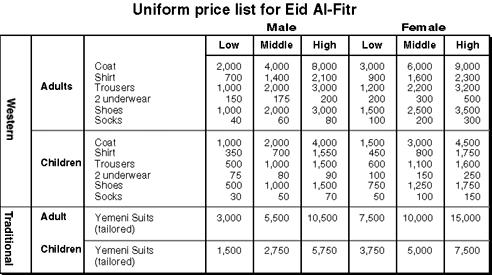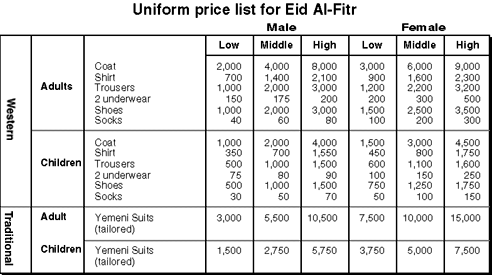
EID AL-FITR THE BURDENS OF JOYOUS DAYS [Archives:1999/01/Business & Economy]
January 4 1999
A Typical Yemeni Family:
One of the most familiar features of the Middle East is the average number of family members. This is usually big as it includes extended members such as grandparents, first and second cousins, nephews and nieces.
Eid Al-Fitr & Related Expenses
These days, the less fortunate members of our society are worried about how to shoulder the expensive needs associated with festivals such as Eid Al-Fitr.
Every member in the family, especially the youngsters, want new clothings, toys, and other gifts. The family has to buy a sheep to slaughter, fruits, and above average food. Guests are to be served juices, cakes, and other confectionery.
Indeed, in two weeks, as Ramadhan ends and the month of Shawal starts, Eid Al-Fitr will bring with it new financial burdens.
Everyone has to celebrate that this occasion. People go back to normal living. They can enjoy regular meals and keep normal eating, smoking, and other habits. No more converting the night into day, and vice versa. No more staying awake all night till the first hours of sunrise, thus affecting normal healthy lifestyle.
The Effects of Eid Al-Fitr on Purchasing Habits:
Now what about prices? The rising cost of living is a nightmare to every citizen in Yemen! The upcoming Eid Al-Fitr has already increased the prices of most clothing items.
How have people reacted to the rise in prices? How has their purchasing behavior changed? Has the effect of price increments been different with government employees compared to the private sector? Are there regional disparities in this matter? In other words have the people of Hadhramaut or Aden or Taiz or Sanaa or Hodeidah reacted differently? These are topics for scholars and researchers to address. But it is clear that even joyous occasions like Eid Al-Fitr come to haunt the less fortunate members of our society.
For the well-to-do Yemenis, they use the occasion to fly out and spend the holidays in vaations in far-away lands. A quick glance at the airline reservations show this fact.
Social harmony and community soldarity are disturbed.
Types of Demand:

There are three levels of buyers in purchases for the upcoming festivities. The high class people often get their needs of clothings, jewelry, and expensive gifts from abroad. The middle-income buyers go to relatively sophisticated boutiques to purchase different kinds of clothings, and other gifts. They also tailor-make their garments rather than buy ready-made. For the low-income people, it is the ordinary stores and shops. Beyond those three economic classes, there are the under-trodden. If they buy at all, these citizens approach the street vendors and they shop from carts – the so-called mobile shops. They look for ordinary and inexpensive clothings.
The Role of Government:
The coming festivals carry opportunities for all Muslims to enjoy themselves following the month-long fasting and piety. It is a moment of joy. Thus, it is up to us to make sure that as many people as possible are happy on this occasion.
The government has to check that the demand pressure does not unnecessarily push up prices beyond control. It should also promote the traditional values of solidarity and harmony among the members of our community.
Finally, the first three days of Shawal (coinciding with 17-19 January, 1999) will be official holidays. Most people will leave town for the countryside to enjoy oneself with family, friends and neighbors. It is up to the government to make sure that there is no run-away holiday of endless days.
By: Ghassan Al-Ahdal,
Yemen Times.
——
[archive-e:01-v:1999-y:1999-d:1999-01-04-p:./1999/iss01/b&e.htm]


